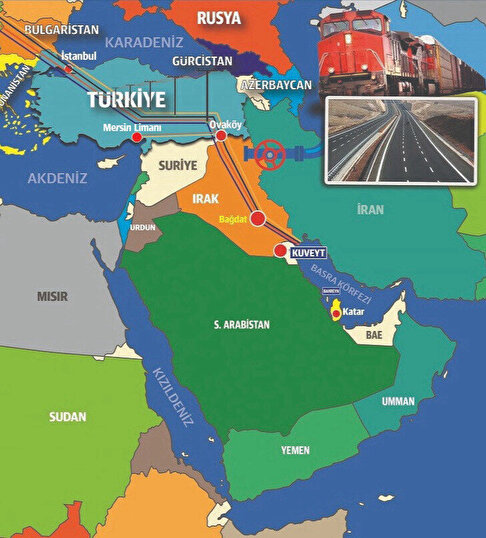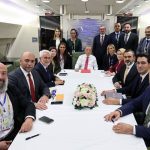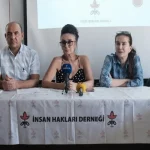Ankara is working hard to develop foreign trade relations in its vicinity and optimise its strategic position on the global economic map. It is also trying to pre-empt the anticipated impact of the economic corridor that Washington proposed in the G20 Summit in New Delhi earlier this month, which will link India to Europe via the Middle East.
Speaking to reporters from New Delhi on 10 September, Turkish President Recep Tayyip Erdogan said that his country would work together with Saudi Arabia, the UAE and Iraq on a ports and road corridor starting in Iraq and passing through the Gulf countries, Israel, Turkey and from there to Europe. He added that he hoped this project would take place in coordination with China’s Belt and Road Initiative.
Washington’s proposed economic projects which will increase the geopolitical influence of its allies are likely to irritate regional and international parties such as Turkey, Iran, and Russia.
A project such as the above-mentioned corridor could limit such ambitions in this region. This helps put in perspective the Turkish foreign minister’s statement on 13 September, ahead of a meeting with his British counterpart, that his government was engaged in intensive talks with Iraq, the UAE, and Qatar on the Turkish-Iraqi Development Road project.
New trade route projects of this sort have become particularly important to Turkey after the adverse global economic impact of the Covid-19 pandemic, the war in Ukraine and the intensifying rivalry between the US/the West and China.
The Turkish-Iraqi Development Road project will consist of a network of maritime routes and overland, high-speed rail and highway linkups between Iraq and Turkey. Its starting point, the Grand Faw Port, which is scheduled for completion in 2025, will be the largest port in the Middle East. The project – also dubbed the Iraqi Silk Road – will cost an estimated $17 billion and be completed in three phases, the first ending in 2028 while the target dates for the second and third are 2033 and 2050. Its aim is to shorten travel and transportation times between Asia and Europe via the Gulf countries and Turkey.
Turkey is positioning itself as a major hub on the global trade and transport map. Its recently announced development road project is a manifestation of the remarkable progress in Ankara’s relations with the Gulf countries after a nearly decade-long freeze.
Ankara has taken major strides in mending its ties with Riyadh and Abu Dhabi in particular. On the eve of Erdogan’s tour of the Gulf in July, Ankara signed a broad array of agreements with these two countries, especially in the military and economic domains. Ankara has also restored its relations with Israel after a rupture of several years.
The Turkish-Iraqi Development Road project is a response to the project that Washington announced in the G20, which excludes Turkey. As Erdogan told reporters on his return flight from India, according to Hürriyet Daily News: “There cannot be a corridor without Turkey. Turkey is an important production and trade base. The most convenient line for east-to-west traffic has to pass through Turkey.”
Certainly, the proposed project can accomplish several strategic gains for the country. Direct links between Turkish ports and various ports in the Levant and the Gulf will strengthen Turkish regional influence and help generate a better environment for improving relations with the Arab region which had deteriorated to an unprecedented nadir in the 2010s.
The transportation network envisioned in the Turkish project includes maritime and overland rail and road routes. Not only will it stretch southwards to Israel, Iraq, and the Gulf countries, it will also extend northwards into Europe and eastwards into the Caucasus and Central Asia, thereby transforming Turkey and Iraq into a transportation and trade nexus between Asia and Europe and, indeed, between East and West.
The project should also open markets for Turkish trade, boosting Turkish exports to Europe and the Middle East. Other countries included in the network would benefit as well, especially given that experts estimate that it will shorten the time it takes to ship goods between Asia and Europe by more than 50 per cent. This will bring about a much-needed improvement in the supply chains to this region.
The Turkish economy has slowed considerably, with the Turkish lira losing two-thirds of its value in two years and high inflation rates crippling many economic sectors. The development road project promises to stimulate the Turkish economy especially if, as anticipated, Turkey becomes both a logistical hub and a centre for Gulf investments in the many enterprises and economic activities that spring up around the project and the transit of goods through Turkey.
When the project is launched, it will mark a major turning point in the way Turkey communicates with the world abroad. It could even shift the map of geopolitical influence in favour of Turkey at the expense of other regional powers.
Nevertheless, the Turkish-Iraqi Development Road project is not without challenges, not least of which is affordability. The economies of Iraq and Jordan, which will also be included in the project, are worse off than Turkey’s.
Despite the improvement in Turkish-Gulf relations, what is more, the Gulf countries still harbour considerable distrust in Ankara’s foreign policies and its intentions towards the Arab region. Turkey’s ongoing interventions in northern Syria and northern Iraq and its continued support for certain ideological currents still rankle among many Arab governments. Given the outstanding bones of contention and intermittent spikes in tensions between Turkey and both Iran and Russia, the project might also encounter obstacles from Tehran and Moscow.
The Turkish-Iraqi project aims to accomplish a range of crucial objectives. In addition to economic growth and expansion, it can serve as a political tool that helps strengthen and diversify Turkey’s relations in the Middle East and elsewhere and bolsters the position of Erdogan and the ruling Justice and Development Party (AKP) at home.
Although they survived the narrowly contested presidential and legislative elections in May, they will soon face the challenges of the municipal elections in which the current economic strains will continue to play a major role. In all events, the project is still at a preliminary phase. In order for it to proceed, Ankara will have to sort out its political differences with the other countries that are taking part in the project, and it will have to muster the resources to finance it.
By: Karam Said
Source: Al-Ahram Weekly



